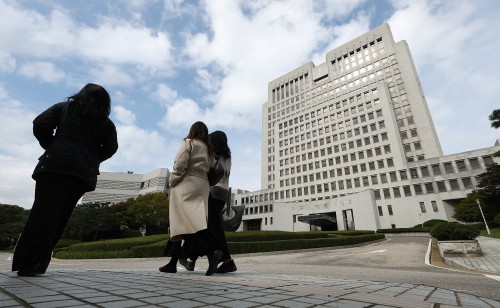 |
| The Supreme Court of Korea in Seocho District, Seoul, on October 20, when the Democratic Party announced a reform plan to expand the bench from 14 to 26 justices. / Source: Yonhap News |
The Democratic Party of Korea (DPK) on Monday unveiled a sweeping judicial reform package that includes expanding the number of Supreme Court justices from 14 to 26 and introducing a controversial “fourth appeal” system that would allow citizens to challenge court rulings directly.
The announcement was made by the party’s Special Committee on Judicial Reform, which outlined six major reform measures during a press briefing at the National Assembly.
DPK leader Jung Chung-rae said public trust in the judiciary “has hit rock bottom,” blaming the court system for the decline. “When the judiciary stands upright, the separation of powers stands upright — and only then can the nation stand upright,” he said, emphasizing his party’s determination to carry out reforms.
Under the proposal, the number of Supreme Court justices would gradually increase by four each year over three years, completing a 26-member bench one year after the law’s promulgation.
Committee chair Rep. Baek Hye-ryeon said the expansion would “restructure the Supreme Court into six panels and two grand chambers functioning as full-bench units,” adding that the measure is intended to improve the depth of judicial deliberation and strengthen citizens’ right to a fair trial.
Other key measures include diversifying the Supreme Court Justice Nomination Committee by removing the court’s administrative chief, expanding the participation of external members in the judicial evaluation process, increasing the public disclosure of first- and second-instance criminal rulings, and introducing a pre-hearing procedure for search and seizure warrants.
Jung also confirmed that the party leadership would take direct initiative to introduce the “constitutional appeal for court rulings,” known as jaepanso-won, saying, “Since the reform committee’s time is limited, the party leadership will sponsor the bill directly and push it as an official party platform to ensure passage in the plenary session.”
He argued that while the Constitutional Court Act already allows citizens to file constitutional complaints, judicial decisions remain exempt. “No matter how high the judiciary may be, it is still an institution under the Constitution,” Jung said, signaling the party’s readiness to confront criticism over what opponents have called the creation of a “fourth level of appeal.”
Most Read
-
1
-
2
-
3
-
4
-
5
-
6
-
7





















